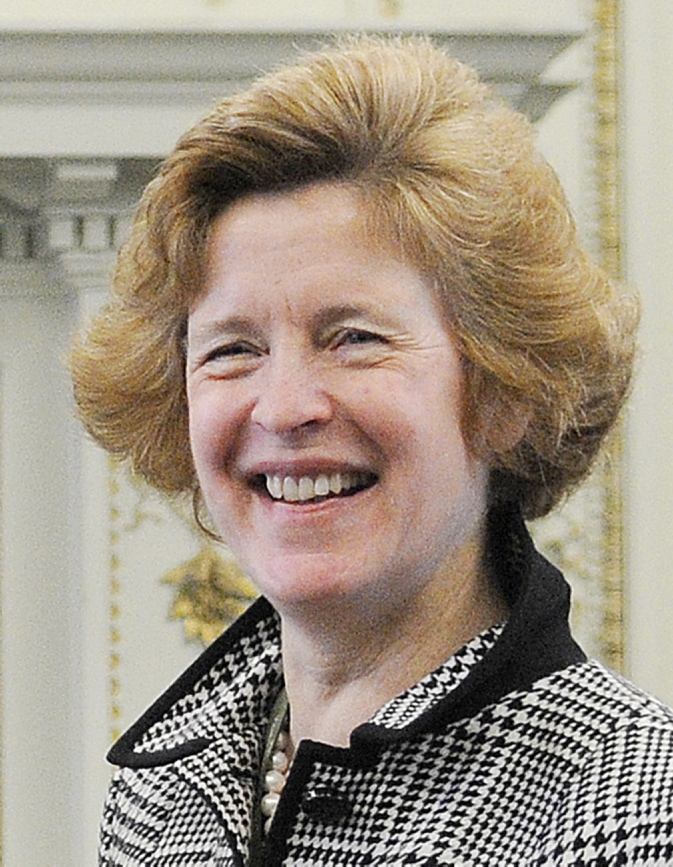AUGUSTA — The city’s attorney argued with the president of Central Maine Power Company in a state Public Utilities Commission proceeding Wednesday about whether the utility improperly used ratepayer resources and CMP’s “good will” in an effort to help its affiliate Maine Natural Gas get new customers.
The city and a group of CMP ratepayers filed a complaint with the PUC last year alleging the company used CMP ratepayer resources, including the time of company president Sara Burns and the good will and reputation of the utility, to help relative newcomer Maine Natural Gas establish its business in central Maine. Both companies are owned by international firm Iberdrola USA.
Burns said in the technical conference Wednesday before PUC staff that her participation in meetings regarding potential Maine Natural Gas customers was as a member of Iberdrola and its affiliated companies’ senior management team. She met with businesses to assure them Maine Natural Gas had the full financial backing of parent company Iberdrola USA.
The PUC voted in July to investigate the allegations raised by the city. It was the latest move in an extended battle between the city and the utility. Maine Natural Gas withdrew its bid for city property contracts in 2013, charging the bid process was flawed. Last year, CMP pushed to change state excise tax laws that would cost Augusta about $250,000 a year, that legislation failed, but a new bill is before the Legislature this year.
Wednesday, Stephen Langsdorf, city attorney, grilled Burns, saying her participation in meetings with potential natural gas customers, including Sappi Fine Paper and UPM Madison paper, was intended to show officials of those firms that CMP backed Maine Natural Gas.
Langsdorf said that participation was an improper use of CMP ratepayer resources. He said the good will CMP has as an established public utility has value, and ratepayers deserve to be compensated for that value by Maine Natural Gas.
“Maine Natural Gas is required to pay CMP for that good will,” Langsdorf said.
PUC rules state that if one utility uses an affiliated utility’s good will, it should be calculated as 1 percent of the total capitalization of the affiliate, or 2 percent of the gross revenues of the affiliate, whichever is less.
Langsdorf said that means if the city prevails in the case, Maine Natural Gas may have to pay CMP roughly $500,000 to $700,000, which should be passed on to ratepayers as savings.
Burns denied Wednesday that she tried to leverage CMP’s good will for the benefit of Maine Natural Gas.
She said she attended a Maine Natural Gas presentation to the Augusta City Council to provide guidance to the gas officials making the presentation.
“My role was to state Iberdrola USA was going to stand behind, financially, the growth of Maine Natural Gas,” Burns said. “I never said CMP. I said it was Iberdrola’s financial commitment.”
CMP officials have said they billed Maine Natural Gas for Burns’ time spent working on that company’s behalf.
Langsdorf said they billed based on Burns’ base salary and argued billing for her time should include the cost of her benefits and overhead, which would increase what Maine Natural Gas would have to pay to CMP.
He also noted that another Maine Natural Gas official, Roy Lane, emailed two central Maine mills setting up meetings to market Maine Natural Gas, writing “Sara Burns, Central Maine Power Company president and board member of Iberdrola USA.”
Burns said she is not a board member of Iberdrola USA. She acknowledged, under questioning from Langsdorf, she gave out her business card at the meetings with potential Maine Natural Gas customers and her business cards identify her as the president of CMP. She noted, however, her cards also say Iberdrola USA.
City officials, in the formal 10-person complaint filed with the PUC, alleged CMP resources, including Burns’ time, were used to wage a battle of retribution against the city on behalf of Maine Natural Gas.
The complaint said officials of CMP and Maine Natural Gas were upset with city officials for how they handled the bid process to procure natural gas service for city buildings.
Maine Natural Gas withdrew its bid for the work after the city allowed its competitor, Summit Natural Gas of Maine, to change its prices after bids had been submitted.
Maine Natural Gas then took out a full-page ad in the Kennebec Journal blasting city officials for what company officials said was a flawed bid process, calling the actions of city administration “shameful.”
Burns Wednesday said that she believed city officials had an issue with CMP after she was told by fellow members of the Augusta Board of Trade that City Manager William Bridgeo had told them a story about an incident some 14 years ago in which then-CMP President David Flanagan had embarrassed him, and that he had never forgotten it.
Burns said she heard about that in late 2012 or 2013 and that Bridgeo “repeated the story to me and I concluded he was still angry and humiliated and I was concerned it was impacting how he felt about CMP and did that color how he handled Maine Natural Gas.”
She said that later that afternoon she called William Stokes, who was mayor of Augusta at the time, to tell him she thought it was inappropriate for Bridgeo to be telling the story.
Bridgeo Wednesday declined to comment on those allegations.
City officials alleged in their initial complaint that CMP officials, as retribution for what they believed was mistreatment of Maine Natural Gas in the city bid process, convinced state Rep. Andrew Buckland, R-Farmington, to submit a bill, which the utility lobbied in favor of, that would change where utilities pay excise taxes on their vehicles.
Utilities now pay excise taxes to the municipality where their headquarters are located, but the bill sought to change that to have utilities pay excise taxes on vehicles where they are kept overnight.
The change, which a CMP lobbyist had testified against when it was proposed in the Legislature previously, could have cost Augusta, as the home to CMP’s headquarters, between $200,000 and $250,000 a year in excise revenue from CMP.
However, the PUC ruled the ability to petition the government, in this case CMP’s right to lobby in favor of the legislation, is a fundamental right protected by the First Amendment. Thus, commissioners said that part of the complaint would not be part of their investigation.
The bill was eventually rejected by the state Legislature, but an identical bill has been introduced to the Legislature again this session. No CMP officials testified on the bill in a recent public hearing before the Taxation Committee.
Bridgeo said Langsdorf is representing the city in the case and his time spent working on it is being tracked and will be billed to the city. The amount to be billed so far was not immediately available late Wednesday.
Bridgeo said the city continues to pursue the case because it is a large ratepayer to CMP, at roughly $1 million a year for electricity to city and school buildings, and because CMP inappropriately used CMP ratepayer resources and good will and officials felt it was an important matter to pursue.
Keith Edwards — 621-5647
kedwards@centralmaine.com
Twitter: @kedwardskj
Send questions/comments to the editors.





Success. Please wait for the page to reload. If the page does not reload within 5 seconds, please refresh the page.
Enter your email and password to access comments.
Hi, to comment on stories you must . This profile is in addition to your subscription and website login.
Already have a commenting profile? .
Invalid username/password.
Please check your email to confirm and complete your registration.
Only subscribers are eligible to post comments. Please subscribe or login first for digital access. Here’s why.
Use the form below to reset your password. When you've submitted your account email, we will send an email with a reset code.